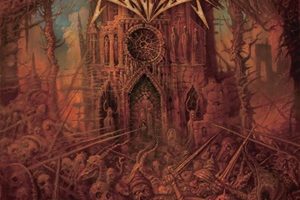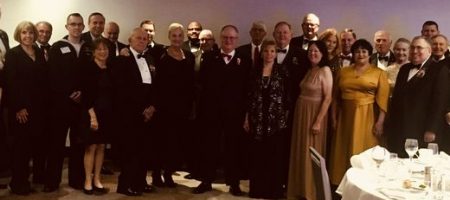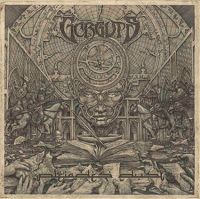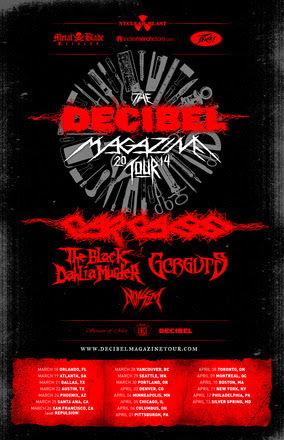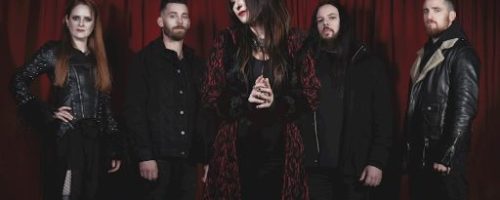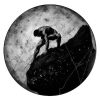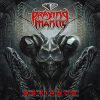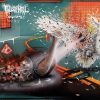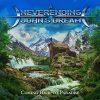Gorguts – Subtle Bodies Reformed
Sunday, 25th August 2013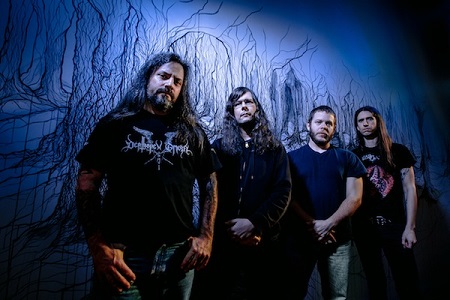
Dormant – at least in terms of studio output – for 12 years, Quebec-based death metal figureheads Gorguts might be a bit late to the 90’s reunion party (see: Atheist, Cynic, and now Carcass), but the prospect of a new album from Luc Lemay and crew is mouth-watering. With their legacy forever intact thanks to 1998’s Obscura (perhaps the boldest album of its kind to come from that decade), Gorguts need not to worry very much about underground skepticism for their new Colored Sands album – it was already a presumed notion the album would resonate. Naturally, it does.
Crisp, yet mystical, meticulous, while not overbearing, Colored Sands might not grab the listener upon immediate impact, yet Lemay (who is joined by Dysrhtymia’s Colin Marston (bass) and Kevin Hufnagel (guitars), and Origin drummer John Longstreth) knows a thing or two about creating impressionable slabs of death metal in his own way. Thus, Colored Sands is pure Gorguts; not Erosion of Sanity Gorguts – more like the next plateau of a matured version of Obscura.
The ULTRA-POLITE (had to put it in caps) Lemay was kind enough to check in with DR to discuss the band’s reformation, the new album, lineup, and survival tips in the late 90’s when virtually no one cared about death metal. Onward we go…
Dead Rhetoric: You were doing Negativa for a few years after Gorguts split. Was there one particular thing or instance that made you get Gorguts back together?
Luc Lemay: The idea came from big Steeve [Hurdle, ex-guitars, who passed away in 2012]. One evening on a Friday night after a Negativa jam, we were in town having a snack, and Steeve goes “Dude, I want to tell you something that I’ve had in mind for a while.” And I was like, “What the fuck, is something wrong?” He goes: “Nothing’s wrong, but I have this idea that I’d think it would be cool for you to do another Gorguts record because the fans would totally love this. In a year or two it will be the band’s 20th anniversary.” And I was like, “Fuck dude – you’re right!” Before, I was playing with Steeve and I was done, but it’s never good to say you’re done with something because your heart can go back or something.
Anyway, I thought this was a great idea – I never noticed 2009 was coming around the corner which would make our 20th anniversary. So I thought, yeah, why not? I had a couple of riffs together because in Negativa, I wrote only one song. And Steeve was the one who got me to take my guitar from under the bed because it was in the case – I hadn’t played for three-four years, but I remember not being ashamed, but not comfortable at all because I was so rusty. It was important in the equation having me playing again. Look where it landed – I could never thank him enough, but unfortunately, he’ll never get to hear the record. He heard some demos before he passed away, but it’s unfinished business for me. I don’t want to hang onto those feelings…let’s say that he can hear the record at some point, or he heard it too much sitting at my desk coming up riffs [laughs].
Dead Rhetoric: I like the term “unfinished business” in terms of where the band is. From Wisdom to Hate did well, but everyone wants to point to Obscura.
Lemay: All the time.
Dead Rhetoric: So it’s not like you’re coming full-circle or anything, but do you feel this puts a nice cap on the period from Obscura to now?
Lemay: From Wisdom…it feels like – how do you say this in English: a “missed rendezvous?”
Dead Rhetoric: Maybe because you got caught in the early 2000’s black metal wave, that could be it.
Lemay: Oh yeah, still. Listen, to come back to Negativa – check it out: People’s or man’s nature, let’s say with Negativa will be like “Oh, this is so much like Obscura.” It’s like, “Hello! You have half the equation here!” You have half a band here, half the writers here – you want a fucking rap album or something? That’s our language as artists, so what do you expect? It’s not like we put it out the easy way – we did Obscura Part II. No, that’s our language. And then after, we do something different – “Oh, Obscura was way better.” At some point, you like it, that’s what art is all about. If it pleases you, fine, if it doesn’t, fine. What do you want me to say?
Within the band discography, you could say we never did the same record twice, very modestly. It’s important for me to say that, because I would never put out an Obscura Part II or a From Wisdom Part II. I’m never going to do Erosion Part II because it takes me everything to play those songs [laughs]. At the end of the day, you need to do it for your own creativity, and to do it for the fans, because as an artist, it’s important to share your creativity with the fans. You can’t have any resonance as an artist if you don’t have a crowd – you can do it in your own little corner, but to share it and have a reaction, have an anchor of love and appreciation, or no reaction – that’s what art is all about.
Dead Rhetoric: The lineup, Kevin, Colin, and Jon – integrating them into the band and getting them adapted to the Gorguts sound – what was the process like? Was it easy?
Lemay: It was…now that I have a step back from the record, and I haven’t wrote music since everything has been done, if from square one, I wanted to shoot for this combination of people, I couldn’t have been more lucky or happy to find these guys. They’re perfect for the band. Colin as a bass player and the way he thinks as a composer, he’s very rigorous, very intelligent, doesn’t put a note here for the sake of putting a note – he can explain where he puts everything in an arrangement because there’s a composer’s vision and reaction to the music. Same thing with Kevin: super-creative, very, very unique player, super-unique style, which blends with the Gorguts style 500%, which isn’t even funny. It’s very natural, the blending of their musical language with the Gorguts sound. Same goes for John. It’s not usual Longstreth drumming.
Dead Rhetoric: It’s not all blasting like it is in Origin.
Lemay: It’s totally different! He can play slow stuff, not that he doesn’t do slow stuff in Origin; maybe two minutes in the whole record [laughs]. I’m joking, but you know what I’m saying. It’s anti-casting totally. People were expecting it to be a flying record, but it’s slower than Obscura. There’s not much blasting; when it’s there, it’s there. It’s more orchestrated, very groovy, very dynamic, very loud, very soft, so that’s what brings the album to be so much different than the others – it’s not static in sound. It has more contrast. It’s very interesting for people to hear John in this type of expression. I couldn’t be happier by finding these people.
Pages: 1 2












